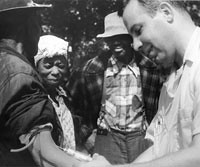
Research subjects during the Tuskegee experiment in the southern United States. Due to such violations of medical ethics many African-Americans are no longer willing to participate in so-called research studies as subjects.
Originally uploaded by Pan-African News Wire File Photos
By Tri-State Defender Newsroom:
Clinical Trials: Addressing a legacy of shame and fear - Part I
by Pharoh Martin
NNPA News Service
The general distrust that African Americans have of clinical trials is
rooted in their strained relationships with medical researchers, some
of whom long ago broke the bond of trust by putting African-American
patients at risk and failing to make full disclosures.
One of history’s most glaring breakdowns of medical ethics occurred in
Tuskegee, Ala., where federal researchers experimented on close to 400 impoverished African-American sharecroppers who suffered from
syphilis. Blood being drawn from victim of Tuskegee syphilis study.
Even so, participation in clinical research is critical today because
African Americans disparately suffer from some of the highest disease
rates and respond differently to many popular medicines and
treatments.
Researchers such as Dr. Claudia Baquet, associate professor of
epidemiology and preventive medicine at the University of Maryland
School of Medicine, and director of its National Bioethics Research
Center, want to re-establish public trust to ensure African-American
issues and challenges are addressed.
“The reason that this is so important is that we know that the public
has a lack of trust in research and also in academic institutions,”
said Baquet, one of the few African-American clinical researchers in
the country.
“We know that African Americans and other under-served communities do not participate in medical research or clinical trials at the same
rate of the general population. We feel that the lack of diversity in
clinical trial participation contributes to health disparities. Plus,
it affects our ability to develop new ways to prevent, diagnose or
treat illness.”
The National Center of Minority Health Disparities, which is a part of
the National Institute of Health, provided Baquet a $2.5 million
dollar grant to establish a national bioethics research center at the
University of Maryland School of Medicine in Baltimore and attempted
to remove the stigma and mysteries associated with medical research
within minority and under-served rural communities. The two-year grant is funded by the stimulus funding passed by the U.S. Congress last year.
Among the educational programs, Baquet established a partnership with the National Newspaper Publishers Association Foundation to encourage journalists to explore the issue of clinical trials and report on the impact of the issue in 2010. Five reporters applied and were selected as fellows, spending two days at the University of Maryland.
They were: Joan Allen of the New York Daily Challenge; Linnie Frank Bailey of Black Voice News in Riverside, Calif.; Elaine Hegwood Bowen of the Chicago Crusader; Gordon Jackson of the Dallas Weekly; and Rhetta Peoples of the Florida Sun in Orlando. (NNPA National Correspondent Pharoh Martin, the writer of this story, also participated.)
The reporters probed the ways African Americans could benefit from
clinical trials and explored the fear that still prevails.
Baquet has also been setting up community educational programs on
bio-ethics in Maryland called “mini-medical schools”. The community
attends a four-week medical school. They are taught some core research methods involving ethics, its history of scandals and tragedies, the federal regulations that came about to protect participants and the application of those protections such as the importance of informed consent, the knowledge level of a person participating in a clinical trial.
Students also receive lessons on health care problems that affect
their communities such as HIV/AIDS, hypertension, diabetes and the
need for vaccines. The approach is multi-layered; in addition to
educating the public researchers it also educates community physicians and nurses.
“There is still the persistent concern about research abuses and
scandals that have happened in the past such as the Public Health
Service’s study of untreated syphilis in Tuskegee, Ala., which
recruited African-American men in Tuskegee who were promised treatment for syphilis,” Baquet said.
“Even after penicillin was identified as a cure, the treatment was
withheld from them by the federal government. So there is still the
persistent fear and concern about being treated like a guinea pig and
not understanding that research has a role to play in improving the
health of the community.”
Because of the historical concerns of events such as the Tuskegee
experiments and others, lecturers go through intense efforts to
explain how federal regulations resulted from such scandals to protect
individuals who participate in clinical trials so that similar
incidents are not repeated.
1 comment:
Clinical trials were indeed not always a pretty picture, but things have improved and we need to make sure the public is well informed. Thank you Mr. Martin for providing a balanced perspective. It is only through this balance that the public will come to trust the information that they receive about clinical research.
An important resource, CISCRP (Center for Information and Study on Clinical Research Participation), takes great pride in its many outreach and educational initiatives -- print and electronic materials and its live, in-person meetings. CISCRP works very hard to present an objective, full picture -- warts and all -- in a language and format that is accessible and easy to understand. One of our primary mottos is 'education before participation' -- emphasizing the importance of complete and balanced learning.
CISCRP can be very helpful to those people interested in learning more about participation in clinical trials.
Another helpful resource is the book: The Gift of Participation: A Guide to Making Informed Decisions About Volunteering for a Clinical Trial (author Kenneth Getz).
We hope you and your readers visit CISCRP.org for more helpful information about participation in clinical trials.
Post a Comment